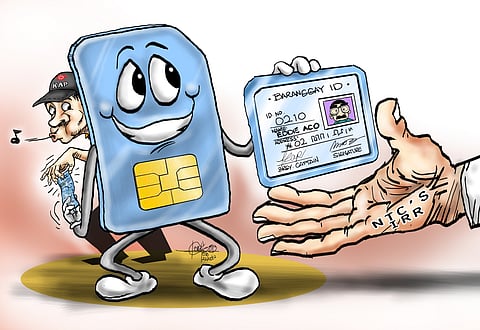
- NEWS
- the EDIT
- COMMENTARY
- BUSINESS
- LIFE
- SHOW
- ACTION
- GLOBAL GOALS
- SNAPS
- DYARYO TIRADA
- MORE

The SIM card registration law, for all intents and purposes, appears to be what the doctor ordered to put sanity back into our electronic communications amid the deluge of unsolicited messages and an alarming spike in telecommunications fraud.
Republic Act 11934, otherwise known as the "SIM Card Registration Act," mandates the registration of all Subscriber Identity Modules to better equip law enforcement authorities in suppressing crimes committed with the use of electronic devices.
With at least 120 million mobile subscribers in the country, it is not surprising that fraudsters would scour the digital space for opportunities. It is for this reason that Congress fast-tracked the passage of the measure which was readily signed by President Ferdinand Marcos Jr.
This law requires all prepaid SIM users to register with their prepaid telecommunications provider before activation. Existing prepaid subscribers are given a limited time to register, otherwise, the SIM gets deactivated.
SIM buyers will be required by telco companies and direct sellers to provide valid identification documents. Registration requires the disclosure of true and accurate information. Using false or fictitious information, as well as fictitious identities, and carrying out fraudulent activities using the SIM are now penalized. Telcos are also required to keep a file of their subscriber SIM cards and submit a quarterly report of their list of authorized SIM dealers and agents nationwide.
While citizens have been divided on the pros and cons of such a measure before its being signed into law, mandatory SIM card registration has been described as necessary for national security and law enforcement despite all its negative implications, including the way it intrudes on a person's privacy.
Perhaps the most alarming aspect is its potential use for surveillance since it will essentially erase the possibility to enjoy the anonymity of communications. It can also enable location-tracking and make communications surveillance and interception quite easy to carry out.
All these discussions are, however, now moot and academic with the passage of the law. In fact, the National Telecommunications Commission has finally released the Implementing Rules and Regulations of the SIM Card Registration Act, making it all set for nationwide implementation on 27 December, exactly five days from now.
While everything appears to have been ironed out, observers have noted one gaping loophole that predators could use to circumvent the new law.
The escape clause can be found in the identification requirement of the IRR which states that ANY of the following identification cards or documents photo shall be presented: Passport; Philippine Identification System ID, or the Philippine Identification Card; Social Security Service ID; Government Service Insurance System e-Card; Driver's License; National Bureau of Investigation clearance; Police clearance; Firearms' License to Own and Possess ID;
Professional Regulation Commission ID; Integrated Bar of the Philippines ID; Overseas Workers Welfare Administration ID; Bureau of Internal Revenue ID; Voter's ID; Senior Citizen's card; Unified Multi-Purpose Identification Card; Persons with Disabilities card; or Other valid government-issued identification with photo.
What is interesting here is the last one which, an observer noted, is a catch-all phrase for "other valid government-issued identification with photo.
As such, Barangay IDs as well as Barangay Residency Certificates can be valid since they meet the simple requirement: Government-issued identification with a photo.
The problem is, we know how easy it is to get them and even fabricate or fake them, unlike the other enumerated IDs that are issued by government agencies at the national level. Barangay officials, as we all know, are very lenient. The IDs and certificates they produce, we are afraid, can easily be reproduced.
And this is where the problem lies. Corrupt barangay officials can collaborate with syndicates in issuing barangay IDs which can then be used to acquire SIM cards for use in their nefarious activities.
We just hope, authorities could see through this before it's too late.
